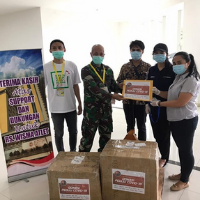Baca dalam Bahasa Indonesia di sini.
Anyone can volunteer – as long as they have a passion for sharing and helping others.
This spirit lives on inside Yudi Setiadi, a volunteer who lives in South Tangerang, Banten. Yudi, who is better known as Dewa by his fellow volunteers, has been involved in the world of volunteering since the 1994 Liwa Earthquake and he was also involved in the 2004 Aceh Tsunami response.

It is no surprise that Dewa’s spirit for volunteering was aroused when the COVID-19 pandemic began to spread in Indonesia. Being affected by the economic impact caused by the pandemic did not prevent Dewa from helping others. Dewa became a COVID-19 volunteer with the National Task Force for COVID-19 at the end of March, just as the government began to advise people to avoid crowds. Dewa also diligently participated in various training sessions provided by the Tim Koordinasi Relawan (TKR), including the Virtual Workshop: Inti Kerja Kemanusiaan held online by RedR Indonesia, in which Dewa also shared his experiences with fellow volunteers.
After waiting for a long time and still not getting an assignment from TKR, Dewa then took the initiative to gather volunteers from all over Indonesia in a group chat via WhatsApp and Telegram. This group is expected to be a channel of communication and networking for volunteers located throughout Indonesia, as well as a hub for sharing information. At the beginning of its formation, the group comprised of about 275 volunteers, both medical and non-medical volunteers. In the group chat, volunteers also encourage one another amid uncertainty about their assignments.
“Even though these volunteers do not have a letter of assignment or official uniform, they continue to act independently, especially in educating and disseminating information in their neighbourhood,” Dewa explained.
The activities carried out by these volunteers are all initiatives taken by themselves. Through the WhatsApp group they also coordinate and communicate if there is a need for volunteers in a particular area. It is not uncommon for volunteers to work outside their neighbourhood in order to help other areas, especially in the Jabodetabek area.
“For example, someone who lives in East Jakarta, if requested, he will also go down to West Jakarta when needed,” said Dewa.
Dewa himself is also considered by volunteers as a coordinator who assists in lobbying hospital and government officials. Some of the activities carried out by Dewa are helping to distribute donated items from the private sector for the Wisma Atlet Hospital and facilitating new COVID-19 patients to get assistance and treatment from the hospital.ta, if requested, he will also go down to West Jakarta when needed,” said Dewa.
“At that time, there were volunteers who reported that their neighbours were positive for COVID-19. I immediately contacted the staff at the Wisma Atlet Hospital so that these patients could receive immediate treatment.”
Dewa also attended an online training course organised by RedR Indonesia. As part of the course there is an interactive discussion session that provides a platform for volunteers to share experiences in their respective areas. The course module presented was also a provision for volunteers to strengthen and improve their volunteering work in the field.
The course is supported by SIAP SIAGA, managed by Palladium, and the training component is coordinated by RedR Indonesia and RedR Australia and funded by the Australian Government. The materials and modules were developed by RedR Indonesia in order to provide volunteers with insights related to humanitarian work. Senior Humanitarian Trainers from RedR India and RedR Australia gave feedback to ensure the quality of the course. The course involves an interactive discussion session that provides a platform for volunteers to share experiences in their respective areas. The course module presented was also an opportunity for volunteers to strengthen and improve their volunteering work in the field.
“Volunteers need not only enthusiasm, but also must be smart. This can be done by continuing to seek new knowledge and information related to volunteer work, either through this RedR training or by networking with other volunteer colleagues.”

